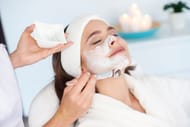Exfoliation is a vital step in any skincare routine, as it helps remove dead skin cells and allows other products to penetrate deeper into the skin. However, not all exfoliation methods are created equal, so it's important to separate fact from fiction.
In this article, we debunk the myth surrounding the trending lemon exfoliation technique and explore safe and effective alternatives. Let's dive in.
Lemon on face every day - A risky skincare trend

Using lemons as a DIY exfoliant may seem like a natural and affordable option, but it can harm your skin. Lemons are highly acidic, which means they can burn and irritate the skin when used directly.
The unstable nature of lemon slices can lead to unpredictable results, including skin discoloration and patches of dryness. Moreover, the acidity of lemon disrupts the pH balance of skin and strips away its natural oils, leaving it dry and prone to irritation.
To ensure the health and clarity of your skin, it's best to avoid this viral trick and steer clear of using lemons as an exfoliant.
Safe and effective exfoliation techniques

While lemon exfoliation may be off the table, there are several other methods that are safe and effective for achieving smooth and radiant skin.
Here are a few options to consider for glowing skin:
Chemical exfoliants: Chemical exfoliants, like those containing acids, retinoids or enzymes, offer a gentler alternative to physical exfoliater. These products work by dissolving the bonds between dead skin cells, revealing fresh skin underneath.
Look for products with ingredients like glycolic acid or salicylic acid, which are effective for different skin concerns. Start with a low concentration, and gradually increase as your skin adjusts.
Physical exfoliants: For those who prefer a manual approach, physical exfoliants can be a good option. However, it's essential to choose gentle products and use them correctly.
Look for exfoliants with fine granules, like sugar or jojoba beads, which provide a mild scrubbing action without causing micro-tears in the skin. When using physical exfoliants, be gentle and avoid over-scrubbing to prevent inflammation and discoloration.
Mandelic acid: If you have sensitive or dry skin, mandelic acid is a fabulous exfoliating ingredient to consider. It has larger molecules than other acids, making it less likely to cause irritation.
Mandelic acid provides an effective exfoliating experience without being too harsh, making it suitable for those with sensitive skin or concerns like rosacea or acne.
Tips for healthy exfoliation routine

To get the most out of your exfoliating routine and maintain healthy skin, you can follow these tips:
Know your skin type: Different skin types require different exfoliating methods. Oily skin can tolerate more frequent and stronger exfoliation, while sensitive or dry skin needs gentler options. Tailor your exfoliating routine to your specific skin type to achieve the best results.
Be gentle: Whether using a chemical or physical exfoliant, gentle application is key. Avoid scrubbing too hard or over-exfoliating one area for too long, as that can lead to skin inflammation and discoloration.
Patch test: Before using a new exfoliating product, perform a patch test on a small area of your skin to check for any adverse reactions or sensitivity.
Sun protection: Exfoliating can make your skin more sensitive to the sun's harmful rays. After exfoliating, apply a broad-spectrum sunscreen with at least SPF 30 to protect your skin from UV damage.
